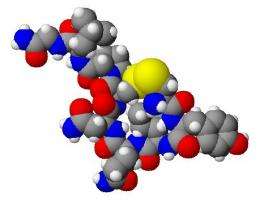February 20, 2015 report
Research duo question whether oxytocin really can be used to treat autism

(Medical Xpress)—A pair of researchers with Emory University in Atlanta has published a Perspective piece in the journal Science, questioning whether oxytocin can help people with an autism spectrum disorder (ASD). In their article, Larry Young and Catherine Barrette note that as it stands right now, no one appears to know the answer to that very basic question because the results of studies conducted to find out have been mixed.
One of the hallmarks of ASDs is disassociation between those who have it (or one of them) and other people—resulting in social isolation. As Young and Barrette note, prior research has shown that oxytocin, a peptide produced naturally by the body, is involved when people pay attention to one another—looking for social cues, etc. For that reason, scientists have been looking into whether introducing oxytocin into the body artificially (via nasal spray) might cause an improvement in disassociation for those with an ASD.
Unfortunately, despite a large number of studies being conducted, no one can really say for sure whether oxytocin can be used to treat those with an ASD. This, Young and Barrette point out, is because of the way the studies have been conducted. There have been too many variables at play—dosage amounts, how long a study was carried out, the age of the patients the small size of groups of those being studied, etc. There is also the little problem of no one really knowing how much oxytocin actually reaches targeted parts of the brain due to the blood/brain barrier. It is also possible, the duo suggest, that introducing oxytocin alone is not enough to solve the problem.
To truly find out once and for all if oxytocin might be useful for treating ASDs, the researchers suggest that parallel human/animal studies be conducted to truly determine the impact of oxytocin on brain communications as it relates to stimuli. Also, more research needs to be conducted that looks into whether oxytocin might best (or only) be used on very young people—those just diagnosed—as it might be possible that other things go wrong over a period of time due to symptoms of the disorder. Also, more research needs to be focused on finding out if adding therapy to drug treatment might make a difference.
More information: Can oxytocin treat autism? Science 20 February 2015: Vol. 347 no. 6224 pp. 825-826. DOI: 10.1126/science.aaa8120
Abstract
The U.S. Centers for Disease Control and Prevention estimates the prevalence of autism spectrum disorders (ASDs) to be 1 in 68 children in the United States, yet no drugs to treat the debilitating social deficits of ASD are available. Oxytocin, a natural brain peptide produced in the hypothalamus, has received considerable attention as a potential treatment for social deficits in ASD. Acute intranasal oxytocin temporarily enhances social cognition, empathy, and reciprocity in individuals with ASD (1). However, recent clinical trials have yielded mixed results, leaving the field questioning whether oxytocin can live up to the hype.
© 2015 Medical Xpress



















